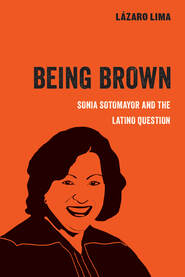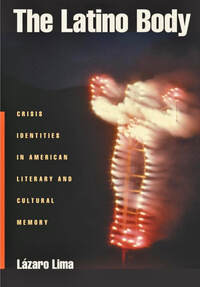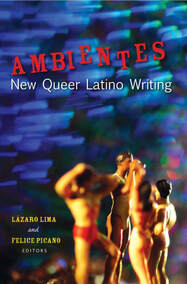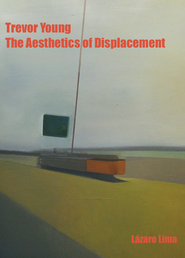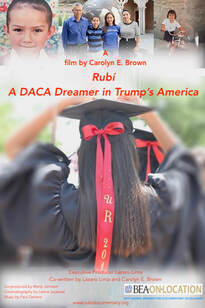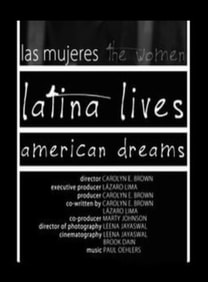CURRICULUM VITAE
|
BOOKS & FILMS
Being Brown: Sonia Sotomayor and the Latino Question (U of California Press, 2019)
PRESS REVIEWS:
"Being Brown reads, and feels, like the right book at the right time. The dream of the ‘Brown Democratic Commons’ that drives so much of Lázaro Lima’s thought, and his hope, in this transformative study has never felt so possible, and so impossible, at the same time." ― Ricardo Ortiz, Latino Studies EDITORIAL REVIEWS: "A scholarly tour-de-force and a readerly treasure.” —Patrick Anderson, University of California, author of Autobiography of a Disease “A scholar of heft, Lima makes writing and argumentation seem easy in the same way that a finished painting or sculpture seem obvious and effortless. Being Brown is inspired, and inspirational, in its rigor and sophistication.” —John ‘Rio’ Riofrio, author of Continental Shifts: Migration, Representation, and the Struggle for Justice in Latin(o) America "We love heroes, but seldom do we extricate the lessons we could learn from their biographies, especially when examined against the historical and political contexts that led to their rise. This important book does just that. Lázaro Lima’s tribute to Sonia Sotomayor is also a timely warning against the pull of narratives of uplift and social mobility [...] and the political work that they do. This book shows we have much to learn from examining Sotomayor’s story about the political enfranchisement of Latinxs, the state of democracy, and what meaningful political enfranchisement should look like. Lima’s astute analysis has lessons for everyone.” —Arlene Dávila, author of El Mall: The Spatial and Class Politics of Shopping Malls in Latin America “In Being Brown, Lázaro Lima offers an indispensable cultural analysis of the first Latina elevated to the U.S. Supreme Court. Brimming with theoretical insights and unexpected points of departure, Being Brown is necessary reading for anyone interested in questions of race, representation, and the future of Latinx democratic practice.” —Cristina Beltrán, author of The Trouble with Unity: Latino Politics and the Creation of Identity “A critical meditation on the significance of Justice Sonia Sotomayor, Being Brown is a nuanced interrogation of the limits of inclusion as framed by a sobering account of the historical and ongoing disenfranchisement of brown life from U.S. civil society. A must-read for a time of crisis.” —Joshua Chambers-Letson, author of After the Party: A Manifesto for Queer of Color Life The Latino Body: Crisis Identities in American Literary and Cultural Memory (NYU Press, Sexual Cultures Series, 2007).
HONORABLE MENTION CHOICE, "Highly recommended" book for 2007 PRESS REVIEWS: "Lima’s book exemplifies the interdisciplinary, comparative promise of a discernable Latino studies project… refreshingly defies canonical confinement or temporal restriction. The Latino Body usefully serves as a map for those striving to stake scholarly claims in the name of Latino studies. [He] offers pointed and measured readings that extend beyond clever interpretation to manifest politically rooted and socially relevant commentary." — R. T. Rodríguez, Latino Studies "In this provocative study, Lázaro Lima links the difficulties the Latino subject faces in the mainstream American imaginary to the 'literal and metaphorical divide between Mexico' and the U.S. [...] Lima's examination concerns the limits and parameters of citizenship. Reading a wide range of texts, he provides a sophisticated and important critique of the limits of US citizenship for Latinos. This text, a worthy contribution to American Studies, inspires more critical analysis of the crisis of Latino bodies in US literary and cultural discourses." — Vanessa K. Valdés, MELUS: Multi-Ethnic Literature of the U.S. "Lima's book makes several crucial contributions. First, it is based on the intersections of various disciplines, such as American, Latin American, and Latino studies with ethnic, queer, gender and cultural studies, allowing for interdisciplinary readings that focus on the multiple dimensions of cultural productions. Second, Lima combines solid historiographical research with literary and cultural analysis, promoting critical interventions that are not seduced by empty impositions of 'high' or 'abstract' theory on literature as a primary, untheorized discourse; on the contrary, Lima takes into consideration each text's very specific context of production [...] Finally, the book has an excellent balance between new... and paradigmatic texts in the canon of Chicano/Latino studies." — Yolanda Martínez-San Miguel, Centro: Journal of the Center for Puerto Rican Studies "Memory, and the visceral pun in Lima's term 're-membering,' tie the various threads in The Latino Body together even as Lima seeks to unravel other threads, other memories. Those interested in deepening their own understanding of Latino literature and culture… may find The Latino Body as practical as it is challenging and intriguing. — Mark Noe, Journal of Latinos and Education "Lima mueve su análisis ágilmente entre discursos literarios y genealogías políticas e históricas diversas, demonstrando ser un apto interlocutor tanto de la producción cultural mexico-americana del siglo diecinueve como de la obra reciente de autores de las diásporas caribeñas." —Carlos Decena, Revista Iberoamericana "An engaging, original, readable work. . . . Highly recommended." — CHOICE EDITORIAL REVIEWS: "Through a bricolage of carefully crafted textual readings, Lima has produced a text that traces the relationship between corporeality and citizenship by marking the process by which the Latino body has become historical. Situated in moments of national and bodily crisis, his archive is decidedly precise and imaginatively expansive, metaphorically rich and politically dynamic. Drawing on texts central to third world feminism, queer studies, and Latin and Latino American literatures, this work is as central to rethinking the American literary canon as it is to an invigorating remapping of Latino Studies." — Juana María Rodríguez, University of California, Berkeley, author of Queer Latinidad "Lima's Latino Body promises to productively disrupt the business-as-usual of critical and scholarly practice in the still-emerging field of U.S. Latino studies; it will contribute directly to the next stage in the long process of what it itself terms Latino identity's 'becoming historical' in North American cultural, political, and intellectual contexts. For this reason alone, The Latino Body could not be more welcome, or more timely." — Ricardo L. Ortíz, Georgetown University, author of Cultural Erotics in Cuban America Ambientes: New Queer Latino Writing (U of Wisconsin Press, 2011).
AWARDS AND HONORABLE MENTIONS Finalist, LGBT Anthology, Lambda Literary Awards Finalist, American Library Association Over the Rainbow Book Award Best Special Interest Book, American Association of School Librarians, selected by Public Library Reviewers Lambda Literary Booklist's most "Highly Anticipated Books of 2011" PRESS REVIEWS: The writers in this new anthology of short stories are doubly disenfranchised: first, by the dominant national discourse, which continues to use racial and ethnic categories when defining what it means to be an American; and second; by a tacit understanding within the Latino community that heterosexual relations are better than homosexual ones. In this vein, the [...] stories included [in Ambientes] challenge these obstacles by celebrating a group of voices that affirm 'We're here, we're Latino and queer, get used to it!'" — Eduardo Febles, The Gay and Lesbian Review "Lazaro Lima, an author and university professor, and well-known, prolific writer Felice Picano have teamed up together to present ... an impressive collection ... that seeks to 'provide a timely and representative archive of queer literary and cultural memory.' Lima's scholarly introduction is a notably smart and lively assessment of the state of Latino culture, and discusses the true intent and creative nature of Latino writing, which, he notes, can often be considered 'narrative acts against oblivion'... There are no duds in the collection." — Jim Piechota, Bay Area Reporter "In his Introduction to Ambientes: New Queer Latino Writing ... Lima defines the [book's] scope as an opening statement in a growing conversation, one that confronts the bias of mainstream American cultural constructs and seeks to 'envison a different kind of national culture' ... Lima and Picano have taken that first step toward transmuting our individual experiences into a larger cultural legacy, and, in turn, opening the door to a broader, more inclusive national identity." — Dan López, Lambda Literary Review "Can you believe it’s been over a decade since Jaime Manrique and Jesse Dorris’ anthology, Bésame Mucho was last published, and almost as long since Tortilleras came out? Finally, a new anthology of LGBT Latino literary expression that collects some of our favorite writers including Lambda Literary Award winner Achy Obejas, finalists Rigoberto González, Myriam Gurba, and Emanuel Xavier, in addition to Charles Rice-González and Steven Cordova." — Antonio González Cerna, Lambda Literary Review EDITORIAL REVIEWS: "With this collection, queer Latina/o writers claim their place in the variegated terrain of contemporary American fiction. Ranging from the erotic to the elegiac, the fantastic to the frighteningly real, these stories entertain our senses and challenge our notions of what it means to be a queer person of color." — Israel Reyes, Dartmouth College, author of Humor and the Eccentric Text in Puerto Rican Literature Literature GALLERY BOOKS
From "Introduction: The Work of Painting in the Age of 'Rear-Facing'" “The advent of the 'iPhone 4' (2010) was world-making in its ability to make digital telecommunications across space and time seemingly ancillary to representational practice. 'The i4,' as it was called — or simply 'the 4' to desiring consumers who camped in make-shift tents for its arrival in Apple stores across the globe — featured a 5 megapixel, 3.85 mmf/2.8 lens, that was 'rear-facing': it allowed the user to be both the subject and the object of the gaze. The emergence of the i4’s 'selfie' function reduced Warholian space-time representational compression, '[i]n the future, everyone will be world-famous for 15 minutes' (1968), from a generational dictum that parodied the culture of commodification to a vapid non-sequitur whose ethical and moral critique of fame, or infamy, were reduced to banal notoriety. In the age of rear-facing, 'I selfie, therefore I am,' might perhaps be the aphorism that best encapsulates our inward-looking and commonplace generational malaise. [...] In current art practice, the zeitgeist's ancillary preoccupation with the subject, rather than, say, the object of art or the politics of representation, has collapsed any meaningful distinctions between art proper with the 'artist-function.' (The ever increasing 'binders full of Jeff Koons artist-types' makes this abundantly clear.) Such aesthetic solipsism is characteristic of the age 'rear facing' where the collapsing of distinctions between the art object, representation, and the subject of art are seemingly subservient to the artist function. Enter Trevor Young (1976 - ), whose Augeian “non-place” paintings evacuate both the 'user' and the 'subject' in order to reframe and retrace the conditions under which beauty, and art as its privileged representational language, can be rendered visible outside the strictures of solipsistic representational indulgence. [...] Trevor Young's evacuation of subjects, literal people, in and through the most obsolete of mediums — painting — allows us to ponder one of the most inevitable but intractable questions in contemporary art practice: Is beauty a thing of the past? In so doing, Young's non-places, paintings exquisite in their indexical traces of absented humanity in empty airports, filling-stations, and highways, renders the artist function as the corpus delicti of contemporary representational practice. Young takes us to the edge of sight in order to bring us back an absented aesthetic language for recognizing beauty in the most recondite of spaces, our everyday non-places. In the process, he allows us to reimagine aesthetic self-possession: the precondition for beauty. [...] Unlike Robert Rauschenberg's famous 1953 performance-erasure of a Willem de Kooning drawing, Young can no longer rely on the artist function, or even the art event itself. His paintings of non-places paradoxically slow down viewing time in the representational spaces emblematic of speed, transit and anonymity. Slowing us down, Young labors to create wrinkles in time that break 'rear-facing' in order to prompt us either to remember art practice as an ever reiterative conversation with the past — if we're fortunate enough to have a memory of temps perdu — or, at his best, to rouse us from the presentist stare in front of the i-Mirror, just long enough to discern the shards of beauty refracted beyond the pale of our reflection's beveled edges." — Lázaro Lima DOCUMENTARY FILMS
Rubí: A DACA Dreamer in Trump's America (documentary film, 2019/2020), co-written with Carolyn Brown.
2019 BEA "On-Location" Award Winner for Documentary Excellence On June 15, 2012, the Secretary of Homeland Security announced that some undocumented Americans that came as children would be able to request consideration for deferred action on deportation or “DACA.” After the 2016 election the Trump presidency’s anti-immigrant policies threatened the status and lives of over 700,000 young adults registered under DACA. Rubí’s story documents the human costs associated with failed immigration policies and how we all lose as a nation when we allow people to become exchangeable commodities under Globalism. This important documentary film by award-winning director Carolyn Brown also tells the story of human resilience in the face of insurmountable odds. La mujeres: Latina Lives, American Dreams (documentary film, 2016)
, co-written with Carolyn Brown.
Latinas constitute the group least likely to graduate from High School. How and why has this come to be? Las mujeres tells the stories of Latina women who are beating the educational roadblocks stacked against them through acts of love and profound imagination. In the process, these Latina stories of educational and personal achievement inspire us to understand how education is a practice of freedom and one of democracy's greatest safeguards. [Early trailer below] SELECT PUBLICATIONS
"Essential Work, Disposable Lives: Latino Invisibility, Black Lives, and Coalition Politics in the Age of Covid-19," in The Discriminatory Impact of COVID-19, Roosevelt House Faculty Journal, July 2020. Hunter College, CUNY: New York, 2020.
Being Brown: Sonia Sotomayor and the Latino Question. University of California Press, 2019. "Empire," Keywords in Latina/o Studies, Larry La Fountain Stokes, Nancy Raquel Mirabal, and Deb Vargas, eds. New York: New York University Press, 2017. "Is Affirmative Action Dead?," AULA Blog Center for Latin American, Center for Latin American and Latino Studies, May 8, 2014. "The King's Toilet: Cruising Literary History in Reinaldo Arenas' Before Night Falls," in Sophia McClennen and Brantley Nicholson, eds., The Generation of '72: The Forced Global Citizens of Latin America. A Contracorriente/North Carolina State University Press, 2013: 229-256. [Expanded book chapter form A Contracorriente, Vol. 10, No. 1, Fall 2012: 198-225]. “Locas al Rescate: The Transnational Hauntings of Queer Latinidad,” Journal of Transnational American Studies, Vol. 3.2, Winter 2011. [Reprise of previously published “outstanding work” in the field of transnational American studies for a wider audience.] “Empire’s Remains: Cuba, Cuban America, and ‘the American 1898,’” American Literary History, 23.2, Summer 2011: 125-136. “Art Against Oblivion: Genealogies of Queer Latino Writing,” in Ambientes: New Queer Latino Writing, co-edited with Felice Picano, Madison, WI: University of Wisconsin Press, 2011: 2-14 “On Usage: The Name of Las Cosas,” co-authored essay with Felice Picano in Ambientes: New Queer Latino Writing, co-edited with Felice Picano, Madison, WI: University of Wisconsin Press, 2011: vi-viii. “Latino Louisiana,” in Latino America: State by State Encyclopedia, Mark Overmyer-Velázquez, ed. Westport: Greenwood Press, 2008: 347-361. (Booklist Editor’s Choice Winner, 2009.) “Deseos de ‘estados queer’ en la producción crítica latina de los Estados Unidos” [The Desire for ‘Queer States’ of being in Queer Latinx Cultural Critique], Revista Iberoamericana, Vol. LXXIV, (Number 225), October-December, 2008: 959-971. “Locas al rescate: The Transnational Hauntings of Queer Cubanidad,” in Cuba Transnational, Damián Fernández, ed. Gainesville, FL: University Press of Florida, 2005: 79-103. “Spanish Speakers and Early ‘Latino’ Expression,” in American History through Literature, 1820-1870, Janet Gabler-Hover and Robert D. Sattelmeyer, eds. New York: Charles Scribner’s and Sons, 2005: 1118-1123. “Haunting the Corpus Delicti: Rafael Campo’s What the Body Told and Wallace Stevens’ (Modernist) Body,” The Wallace Stevens Journal (WSJ). Vol. 25 (Number 2), Fall 2001: 220-231. FELLOWSHIPS AND AWARDS My research and scholarship has also been generously supported by many institutions and foundations, including grants and awards from the Andrew W. Mellon Foundation, the National Endowment for the Humanities and the American Library Association's "Common Good Humanities Initiative" for "Latinos in Richmond."
|
NARRATIVE CV
In my research and scholarship I explore how the intersections of nationalism, race, language, gender, and sexuality have given rise to majority conceptions of "minority" subjectivity in the United States as well as how subaltern affronts against entrenched notions of "American" cultural identity have transformed the nation. My first book, The Latino Body: Crisis Identities in American Literary and Cultural Memory (New York University Press, 2007), examined key "crisis moments" in United States cultural history that have shaped and given rise to what today we would consider "Latina" and "Latino" forms of personhood. The book analyzed how print culture after the end of the U.S-Mexico War of 1848 reconfigured race relations in the United States by organizing national belonging around an axis of race as opposed to the category of citizenship in jurisprudence. It is for this reason, for example, that the national signifier "Mexican" became a racial designation in the United States rather than one of national affiliation after the incorporation of almost half of Mexico’s territories.
These concerns related to inter-American cultural history, sexuality, race, and ethnic identity are extended in my second book Ambientes: New Queer Latino Writing (University of Wisconsin Press, 2011) which I co-edited with Violet Quill co-founder Felice Picano. Ambientes is one of the first annotated collections to compile pan-Latino LGBTQ writing by both established and emerging voices. The collection contains a framing essay I wrote on the literary and cultural historiography of Latino LGBTQ writing in the United States as well as a co-authored essay on the importance of taking Spanish seriously as a language of national becoming. The collection compiles post-Stonewall queer Latino narratives in order to reconfigure the operative models of "gay and lesbian" cultural studies that have dominated the field. Ambientes sets the parameters for understanding how queer Latino cultural production has been delimited by monolingual and monological investments that often fail to register how Latino "counter-publics" fashion civic belonging outside the sanctioned imperatives of the "coming out narrative" that has functioned as the sine qua non of queer political critique. Many of these structural, thematic, and analytical considerations about the nature of national belonging, cultural participation, and Latino and Latina political emergence are central to my documentary film work. Las mujeres: Latina Lives, American Dreams, co-written with award-winning filmmaker Carrie Brown, considers the framing conceits of the "American dream" of social mobility and civic participation to be incommensurate with the lived reality of the nation's largest "minority majority." The documentary explores what it means to aspire when labor, home, country, institutions and even family—often all too painfully—delimit our possibilities for self-making and being fully in the world. What does it mean to dream big, fail, and aspire again? What does it mean to imagine happiness in a broken world? Through the varied stories of cis and trans Latina women, Las mujeres situates timely questions about Latina and Latino civic personhood at an historical juncture in need of moving beyond "possibility models" and toward a more complete understanding of how and why democratic practice is failing, rather than enfranchising, such a significant segment of the population. A second documentary film, Rubí's Story: A DACA Dreamer in Trump's America, tells the story of how the Trump presidency's anti-immigrant stance has imperiled the lives and aspirations of over 600,000 young adults now registered under DACA. The film documents the nation's resurgence of anti-immigration bigotry and violence through the experiences of a young woman, Rubí, who exemplifies both the human costs associated with failed immigration policies as well as the resilience necessary to survive in an age of Globalism where people become exchangeable commodities under capital. In my last book, Being Brown: Sonia Sotomayor and the Latino Question, I analyzed the spectacular life story of the first "Latina" Supreme Court Justice and how her own self-making as a possibility model for Latinos, allows us to understand both the appeal and the limits of "representative personhood." (Representative personhood is a distinctly "American" from of political emergence that, from Emerson, to John Dewy, to Thurgood Marshall, to Sotomayor herself, posits that success is for the taking by anyone who wishes it through assimilation and sheer hard work.) The book ultimately analyzes and critiques how Sotomayor is admired in a way that is intelligible in contemporary American culture by making her represent the elusive fulfillment of an exhausted "American dream." In the process, Sonia Sotomayor becomes a figure through whom the character and promise of American political life can be articulated anew for scores of disenfranchised nationals by substituting the political dirty work of inclusion required in democratic practice with the simulacrum of inclusion offered through the American life story of social mobility and success through assimilation. My scholarly work has also appeared in academic journals, edited volumes, reviews, popular press pieces, gallery catalogs, and internet journalism. Some representative articles, in both thematic content and methodological scope, include "The King's Toilet: Cruising Literary History in Reinaldo Arenas' Before Night Falls," A Contracorriente (Vol. 10, No. 1, Fall 2012: 198-225); "Empire's Remains: Cuba, Cuban America, and 'the American 1898,'" American Literary History (Vol. 23.2, Summer, 2011: 125-136); "Deseos de estados 'queer' en la producción crítica latina de los Estados Unidos," Revista Iberoamericana (Vol. LXXIV, Number 225, October-December, 2008: 959-971); "Locas al rescate: The Transnational Hauntings of Queer Cubanidad," in Cuba Transnational, Damián Fernández, ed. (University Press of Florida, 2005: 79-103), which was recently reprised in the Journal of Transnational American Studies; and "Haunting the Corpus Delicti: Rafael Campo's What the Body Told and Wallace Stevens' Modernist Body," The Wallace Stevens Journal (Vol. 25, No. 2, Fall 2001: 220-231), which was chosen as a companion article for Rafael Campos' poetry in Twentieth Century American Poetry (McGraw Hill, 2003). I'm working on three extended form projects. The first, Daddy, constitutes a cultural history of phallocracy through the lens of trans and queer embodiment and theoretics. The second, Broken Things: The Aesthetics of Disrepair, reframes the story of minoritarian discard, refuse, and detritus along an axis of flesh, bones, bodies, and systems in the wake of empire. A third project, The Black and Brown Sensorium: On Freedom's Afterlives in the Democratic Commons, considers Brown and Black experiential confrontations with the limits of the commons. I am also the founder of the The Black and Latinx Sensorium Lab, a public humanities project and incubator that links academics, activists, students, and communities to public-facing salon projects centered on democratic practice, racial justice, equality and historical redress. My research and scholarship has also been generously supported by many institutions and foundations, including grants and awards from the Andrew W. Mellon Foundation, the National Endowment for the Humanities and the American Library Association's "Common Good Humanities Initiative" for "Latinos in Richmond." |

